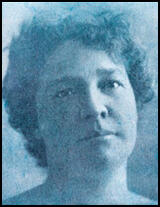Mildred Aldrich

Mildred Aldrich was born in Providence, Rhode Island, in 1853. After graduating from Everett High School in 1872 she taught elementary school in Boston, Massachusetts.
Aldrich began her career as a journalist with the Boston Home Journal and later contributed to Arena, and the Boston Herald. For a short period in 1892 she also edited the magazine, The Mahogany Tree.
In 1898 Aldrich moved to France and while living in Paris became a close friend of Gertrude Stein. Aldrich worked as a foreign correspondent and newspaper critic until retiring to Huiry, a village on the outskirts of Paris. She wrote to Stein in June 1914: "It will be the bloodiest affair the world has ever seen - a war in the air, under the sea as well as on it, and carried out with the most effective man-slaughtering machines ever used in battle."
During the First World War Aldrich wrote A Hilltop on the Marne (1915), a book based on her journal entries (3rd June - 8th September 1914) and on letters she wrote to Gertrude Stein. The book sold well in the United States and she followed it with On the Edge of the War Zone (1917), The Peak of the Load (1918) and When Johnny Comes Marching Home (1919).
The French government believed that Aldrich's work helped persuade the US government to declare war on Germany and in 1922 was awarded the Legion of Honour.
Mildred Aldrich died in Huiry, France, on 19th February, 1928.
Primary Sources
(1) Mildred Aldrich, letter to Gertrude Stein (June, 1914)
It will be the bloodiest affair the world has ever seen - a war in the air, under the sea as well as on it, and carried out with the most effective man-slaughtering machines ever used in battle.
(2) Mildred Aldrich was living in France when Germany invaded in August 1914.
A dozen times during the afternoon I went into the study and tried to read. Little groups of old men, women, and children were in the road, mounted on the barricade which the English had left. I could hear the murmur of their voices. In vain I tried to stay indoors. The thing was stronger than I, and in spite of myself, I would go out on the lawn and, field-glass in hand, watch the smoke. To my imagination every shot meant awful slaughter, and between me and the terrible thing stretched a beautiful country, as calm in the sunshine as if horrors were not.
It was just about six o'clock when the first bomb that we could really see came over the hill. The sun was setting. For two hours we saw them rise, descend, explode. Then a little smoke would rise from one hamlet, then from another; then a tiny flame - hardly more than a spark - would be visible; and by dark the whole plain was on fire.

